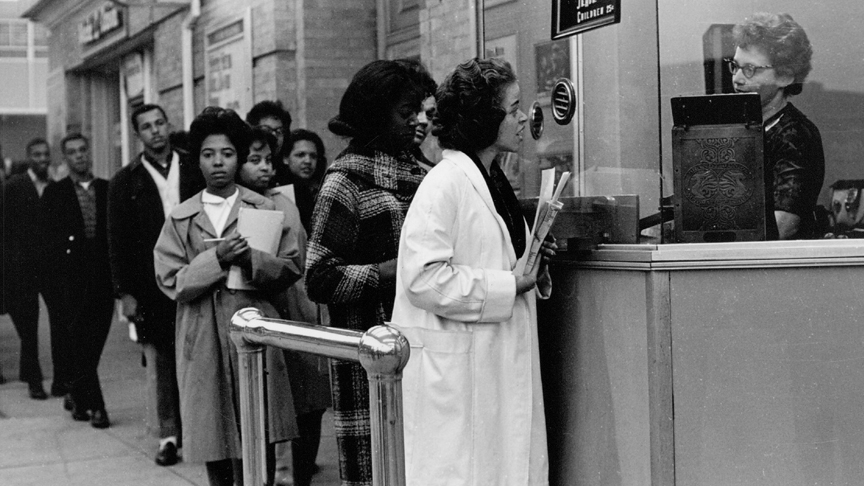
Protester Courtney Scott Ferguson with other activists during a "Round Robin" protest (Via Carolina Theatre of Durham)
Thursday, Feb. 22, 2024
By Sydney Brainard
The Carolina Theatre of Durham was built as a segregated theater in 1926 during the Jim Crow era. After almost a century, the theater is celebrating the 10th anniversary of their Confronting Change exhibit this year, which focuses on the efforts of activists to desegregate the theater in the early 1960s.
Before desegregation, Black patrons of the theater were forced to use a separate ticket window and climb up 97 steps on the outside of the building to reach the second, and only, balcony where they were allowed to sit.
Durham’s Youth Chapter of the NAACP, along with civil rights leader and attorney, Floyd McKissick, began protesting this policy in 1961. They had a strong case to pursue, as the Carolina Theatre was technically housed in a city-owned building, meaning that Durham was using taxpayer money to further segregation.
“We wanted to take direct action, so we did sit-ins, we did picket lines, we did boycotts of stores, and we took on the Carolina Theatre by asking that they end the segregation policies, and the theater declined to do that,” Walter Riley, president of Durham’s Youth Chapter of the NAACP from 1961 to 1963, said. “So we thought we would organize to have an economic impact on the theater, at the same time, we got publicity for our positions, so we started what was called the round robin.”
The round robin strategy began in 1962, and it involved Black patrons hopping in the line for the white-only ticket window. When they got to the front of the line and were refused service, they held a conversation with the ticket seller for as long as possible.
“Discussions would be, you know, ‘Why can’t I get a ticket?’ ‘I’m here, I have my money,’ ‘I’m a human being,’ any number of things that people come up with to have the discussions,” Riley said.
Once they were turned away, they would go right back to the end of the line and repeat the process. These types of protests had a significant economic impact on the theater.
“This went on for several years,” Jordan Hewitt Beard, senior director of marketing at the Carolina Theatre of Durham, said. “It caused a lot of issues for the box office, trying to process the tickets that they wanted to process.”
While the round robin strategy was their primary technique, the protesters also utilized white students from nearby schools like Duke University. The white students would buy tickets for them and then the protestors would take on the daunting task of attempting to sit in the white-only section of the theater, filled to capacity with white people who did not want them there.
“In Durham, there was always the possibility there’d be some hooligans – white, young folks that would want to fight,” Riley said.
In 1963, after years of protests and a change in leadership in Durham, the theater finally relented to the idea of integration. They began with a twenty-day trial period, requiring Black patrons to pre-order their tickets and present their IDs, before eventually fully desegregating the theater.
“It’s interesting, too, because I think people hear that the theater was desegregated, and that’s great, but for a lot of the protesters, this was just a start,” Hewitt Beard said.
In 2014, the Confronting Change exhibit opened. Located at the entrance to the second balcony, the exhibit highlights the desegregation efforts of civil rights activists and includes news clippings, photos and descriptions of several of the movement’s leaders, as well as the original window frame and rail from the “Colored” box office.
The exhibit was created by the Carolina Theatre’s Civil Rights Committee using artifacts and eyewitness accounts.
“It was motivated by people deciding to do the right thing, or at least get started on doing the right thing, and telling a story that’s beneficial to the community,” Brett Chambers, former Carolina Theatre board member, said.
The 10th anniversary celebration involves several events, including a Civil Rights Panel Discussion in March and a showing of “Show Way: The Musical” in April.
“I think it’s really important to acknowledge and recognize and keep the history moving forward, make it a living history, as opposed to just that one moment in time,” Chambers said.
Edited by Ava Dobson